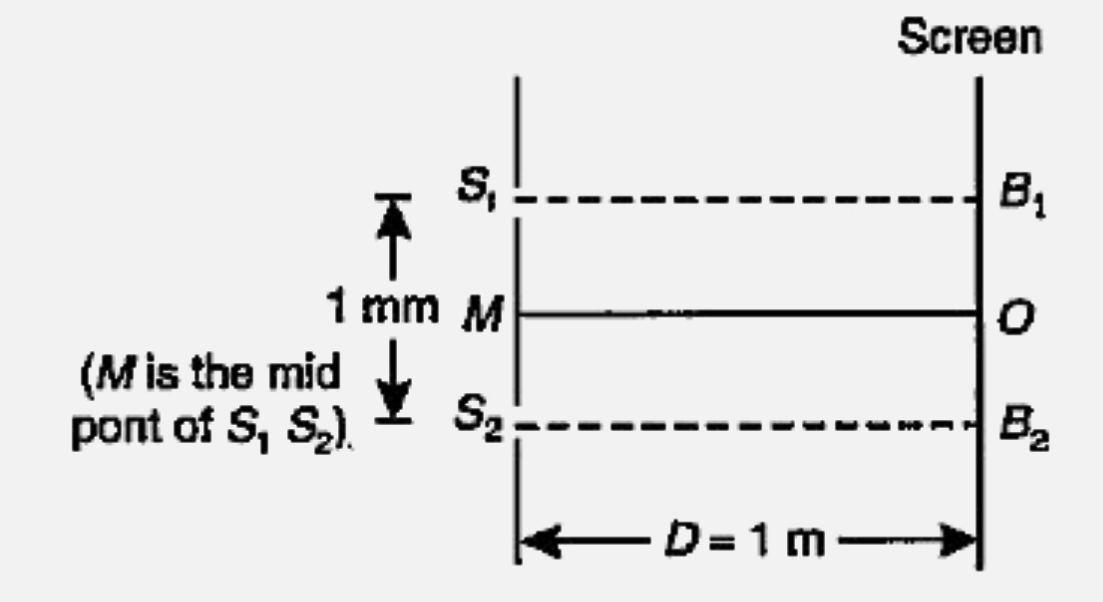A mixture of light, consisting of wavelength 590 nm and an unknown wavelength, illuminates Young's double slit and gives rise to two overlapping interference patterns on the screen. The central maximum of both lights coincide. Further, it is observed that the third bright fringe of known light coincides with the 4th bright fringe of the unknown light. From this data, the wavelength of the unknown light is
885.0 nm
442.5 nm
776.8 nm
393.4 nm
The correct Answer is:B
Step by step video & image solution for A mixture of light, consisting of wavelength 590 nm and an unknown wavelength, illuminates Young's double slit and gives rise to two overlapping interference patterns on the screen. The central maximum of both lights coincide. Further, it is observed that the third bright fringe of known light coincides with the 4^(th) bright fringe of the unknown light. From this data, the wavelength of the unknown light is by Physics experts to help you in doubts & scoring excellent marks in Class 12 exams.
Topper's Solved these Questions
- BOOK - AAKASH SERIESCHAPTER - WAVE OPTICSEXERCISE - Practice Sheet (Exercise - I) (INTERFERENCE & YDSE) (Level - II (Advanced) Straight Objective Type questions9videos
WAVE OPTICS
- BOOK - AAKASH SERIESCHAPTER - WAVE OPTICSEXERCISE - Practice Sheet (Exercise - I) (INTERFERENCE & YDSE) (Level - II (Advanced) More than one correct answer type questions2videos
WAVE OPTICS
- BOOK - AAKASH SERIESCHAPTER - WAVE OPTICSEXERCISE - LECTURE SHEET Exercise - III POLARLISATION (Level-II (Straight objective Type questions))8videos
WAVE OPTICS
- BOOK - AAKASH SERIESCHAPTER - WAVE MOTION AND SOUNDEXERCISE - PROBLEMS (LEVEL - II)97videos
WAVE MOTION AND SOUND
- BOOK - AAKASH SERIESCHAPTER - WAVESEXERCISE - EXERCISE-III (Doppler effect :)15videos
WAVES
Similar Questions
A micture of light, consisting of wavelength 590nm and an unknown wavelength, illuminates Young's double slit and gives rise to two overlapping interference patterns on the scree. The central maximum of both lights coincide. Further, it is obseved that the third bright fringe of known light coincides with the 4th bright fringe of the unknown light. From this data, the wavelength of the unknown light is:
View SolutionA beam of light consisting of two wavelength, 650 nm and 520 nm, is used to obtain interference fringes in a Young's double - slit experiment. Find the distance of the third bright fringe on the screen from the central maximum for wavelengths 650 nm.
View Solution
Knowledge Check
- Question 1 - Select One
Two sources of light of wavelengths 2500 Å and 3500 Å are used in Young’s double slit expt. simultaneously. Which orders of fringes of two wavelength patterns coincide?
A3rd order of 1st and 5th order of 2ndB7th order of 1st and 5th order of 2ndC5th order of 1st and 3rd order of 2ndD5th order of 1st and 7th order of 2nd - Question 2 - Select One
Two sources of light of wavelength 2500 Ã… and 3500 Ã… are used in Young's double slit experiment simultaneously. Which orders of fringes of two wavelength patterns coincide?
A3rd order of 1st source and 5th of the 2ndB7th order of 1st and 5th order of 2ndC5th order of 1st and 3rd order of 2ndD5th order of 1st and 7th order of 2nd - Question 3 - Select One
A beam of light consisting of two wavelengths 650nm and 520nm is used to obtain interference fringes in a Young's double slit experiment.
(a) Find the distance of the third bright fringe on the screen from the central maximum for the wavelength 650nm.
(b) What is the least distance from the central maximum where the bright fringes due to both the wavelengths coincide? The distance between the slits is 2mm and the distance between the plane of the slits and screen is 120cm.A1.17 mmB2.52 mmC1.56 mmD3.14 mm
Following figure shows the positions of the first bright fringes B1andB2 on either side of the central bright fringe O in Young.s double slit experiment. Find the wavelength of monochromatic light used.
 View Solution
View SolutionA beam of light consisting of two wavelengths, 650 nm and 520 nm is used to obtain interference fringes in Young's double-slit experiment. What is the least distance (in m) from a central maximum where the bright fringes due to both the wavelengths coincide ? The distance between the slits is 3 mm and the distance between the plane of the slits and the screen is 150 cm.
View SolutionA beam of light consisting of two wavelengths 6500A0 and 5200A0 is used to obtain interference fringes in a Young's double slit experiment.
Find the distance of the third bright fringe on the screen from the central maximum for wavelength 6500A0. The distance between the slits is 2mm and the distance between the plane of the slits and the screen is 120 cm.View SolutionA beam of light consisting of two wavelength , 6500A∘ and 5200A∘ is used to obtain interference fringes in a Young's double slit experiment (1Å=10−10m). The distance between the slits 2.0 mm and the distance between the plane of the slits and the screen is 120 cm. Find the distance of the third bright fringe on the screen from the central maximum for the wavelength 6500Å.
View SolutionIn Young's double-slit experiment, the slit are 0.5 mm apart and the interference is observed on a screen at a distance of 100 cm from the slits, It is found that the ninth bright fringe is at a distance of 7.5 mm from the second dark fringe from the center of the fringe pattern. The wavelength of the light used in nm is
View Solution
